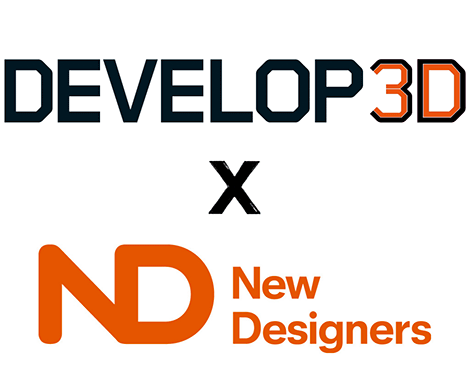
Another year of high-flying product design graduates were on show at New Designers, London, where we headed along to uncover the most eye-catching new industry talents.
Here we’ve picked our favourite 15 graduates and their final year projects, with this long list reducing to our Top 3 to be published in the summer issue of DEVELOP3D Magazine.
As with anything that adds a swig of competitive nature to design, people will have their own opinions, but please be aware that is probably more to the projects shown below than the quick pic and description implies – we encourage you to look further at all the projects and the designers behind them.
So well done to all graduating in 2017 and congratulations to the 15 below that have displayed a mix of brilliant ideas, excellent execution, business-nosed nouse, and problem solving skills that set them apart in our eyes:
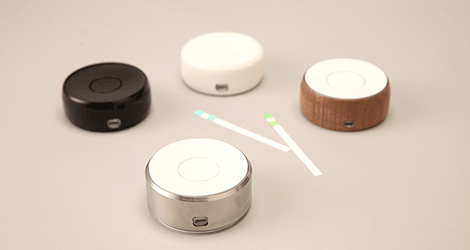
Imogen Adams / Brunel University
Ally Food Allergen Tester
A portable food allergen testing device and app with the potential to go to market at a fraction of the cost of comparable products, Ally aims to ease the anxiety of food allergy sufferers through use of a dipped test strip and a doughnut-sized bluetooth reader.
Adams based the design on her own concerns as a vegetarian when travelling abroad, and has focussed the device on allergies that could be life threatening – designing and building the working prototype.
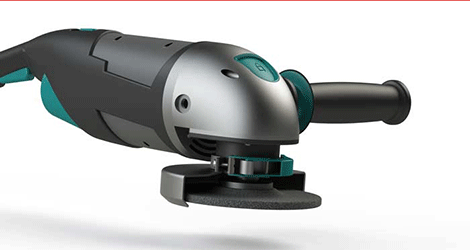
Joseph Butler / Sheffield Hallam University
Anti-HAVS Power Tools
Hand-arm Vibration Syndrome comes from the use of hand-held power tools and causes painful and disabling disorders of the blood vessels, nerves and joints – an issue that can arise after only minutes using a power tool, prompting Butler to redesign a present-day product.
By inserting slim dampners, adjusting the angles of the hold points and adding vibration-absorbing grips, the overall design (Butler has explored adjusting almost every component) is transformed into a safer everyday work tool.
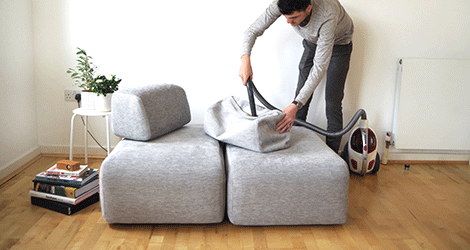
Lewis Calderwood / Ravensbourne University
Morf Apartment Seating
Morf is a modular sofa system designed for ‘generation rent’: inspired by the modern delivery of vacuum packed mattresses to utilises a household vacuum cleaner, the design allows the sofa to reduce in size to allow easy moving and quick change covers that keep its style up to date.
Calderwood spent time looking at the various compatible foams, experimenting with different forms, and ultimately creating a collection of parts that can be purchased over time, used to build flexible set-ups that can adapt and grow as the user inevitably has to pack up and move on.
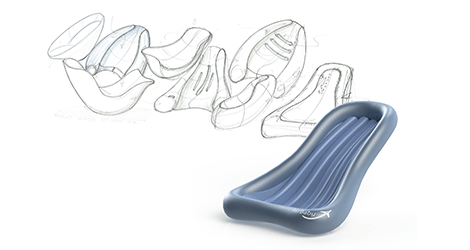
Kayleigh Dobson / UCLAN
AirBaby Travel Cot
A portable, inflatable lap seat, which enables parents to hold babies securely and comfortably during a flight, Dobson’s design is so brilliantly simplistic it belies what a great idea it is and the amount of time spent perfecting the form.
The AirBaby design is cost-effective, portable and multi-use, not only for the time spent both pre- and post-flight (especially those that are hand luggage only), but even in the home.
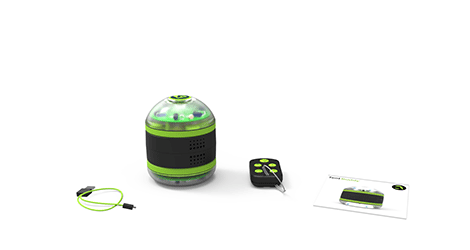
Eleanor Duley / UWE
Tent Buddy
Giving campers and festival goers the ability to light, secure and locate their tent, Tent Buddy features an internal light, motion sensor alarm, and external light – which can flash on demand to help guide you back across a busy campsite.
Attaching via strong magnets to connect through the skins of the tent, Tent Buddy can be positioned anywhere needed, with Duley producing a working prototype, along with further iterations to advance the design and lower the cost.
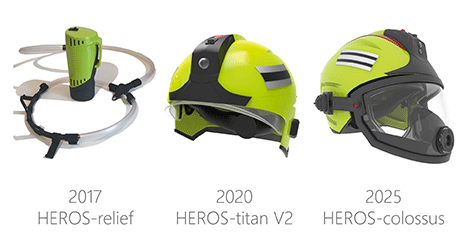
Emily Hancock / De Montfort University
Fire Helmet Progression
Three products designed to allow fire fighting personal protective equipment manufacturers Rosenbauer to maintain its industry lead, Hancock tackled the challenge with real life development schedules and end client budgeting constraints in consideration.
The first features a retrofitted de-misting system within current helmets, the second design for 2020 has more features as well as firefighter tracking, while the 2025 model is billed as ‘market disrupting’ with a combined a visor and helmet. Clever, safety conscious and cost-effective design with a real life edge.
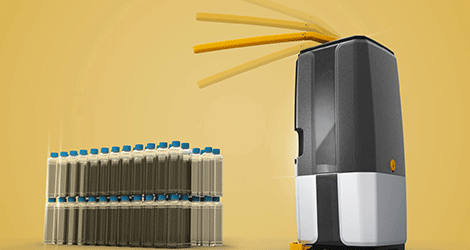
Laurence Hills / Loughborough University
OSMOS Water Desalinator
Using cost-effective standard plumbing components to route contaminated or salt water through a three-stage filtration process, OSMOS is purely mechanical – needing no heat or electricity – eliminating the need for aid agencies to distribute bottled water in disaster zones.
Hills’ mechanical prototype showed great practical thinking for the task at hand, while the concept aesthetics package the product cleanly for the task.
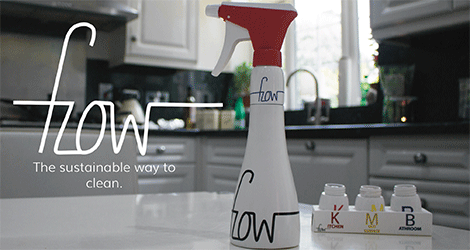
Bradley Humphrey / Ravensbourne University
Flow Cleaning Products
More than 90 per cent of a cleaning product’s make up is water, with this in mind Flow is designed to take chemical 10 per cent into granulated form where it can attach to a spray bottle and mix with water before leaving the nozzle.
It’s a idea we’ve seen before, yet it’s obvious where Humphrey has spent time honing the product – from which nozzles and spray units perform best, to developing clever sales packaging for selling the small interconnecting chemicals units – making a practical product with clear marketability.
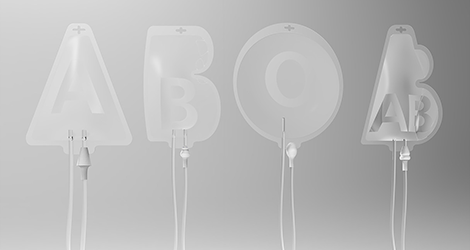
Ciara Little / Sheffield Hallam University
A/B/O Blood Bags
Blood type specific transfusion kits designed to prevent ‘Never Events’ where as little as 10ml of the wrong ABO blood type can be fatal.
The product contains three well thought out elements: The form of each bag visually represents the corresponding ABO blood type; an NFC labelling system reduces cluttered data into simple graphical format; and a connector system based on sensory cues allow only corresponding connections to be made with the bag.
https://giphy.com/embed/2OSkBMfSrc96o
Karl Motton / Bournemouth University
Snug Incubator
Snug is an affordable neonatal incubator with a reliable secondary power supply for use in developing countries, designed with the aim of saving the lives of infants in desperate need of basic and cost effective healthcare.
The unit utilises visual feedback for the operator, with LED lighting system acting as a considerate alternative to audible feedback, while three buttons mean anyone can operate the incubator without medical training.
An outstanding piece of work, Motton produced a fully working prototype, along with exceptional research, documentation of the process, and going as far as to create a campaign to help with fund raising to assist the adoption of Snug incubators in developing countries.
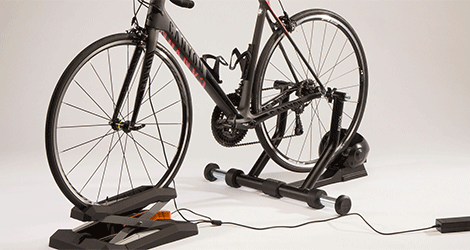
Pawel Procner / De Montfort University
Ryzer Indoor Cycling Gradient
Indoor cycling is a fundamental part of a cyclists training program, with simulation software such as Zwift allowing cyclists to cycle with each other whilst still being at home using a smart turbo trainer.
Ryzer was developed to fit under the front wheel, lifting the front of the bike when an increased gradient is met on the software, while the turbo trainer increases the resistance as usual, realistically simulating the climb and giving more rounded muscle development.
A keen cyclist, Procner’s creation reflected this, and the project resulted in a full size working prototype with scope for further development.
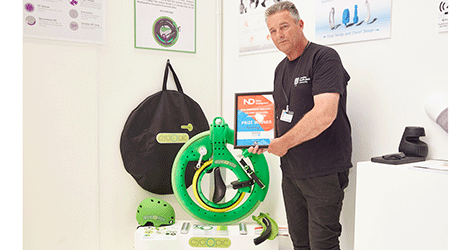
Alan Rallings / London South Bank University
Cyclopic Folding Bicycle
A folding bicycle concept inspired by the ‘hollow wheel’ design, it allows the back wheel to fold inside the front – making for an extremely compact folded unit – which has been realised as a child-sized frame.
The design has all the scope to progress into an adult-sized model, with Rallings experience in CNC machining as an aerospace engineer put to one side as he investigated 3D printing for its concept manufacture.
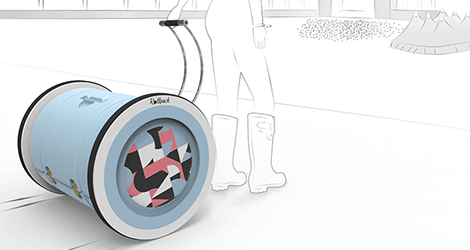
Emma Rothwell / University of Huddersfield
RollPack Festival Luggage
With outdoor festivals now being such a huge market it wasn’t a surprise to see more products catering for muddy fields under starlight – case in point: the RollPack.
Keeping a weekend’s worth of possessions waterproof, secure and wheeling over waves of knee deep slurry, the pack can be upended to form a table or seat while waiting for the bus home. Its aesthetics are also customisable, with Rothwell even designing an online design configurator.
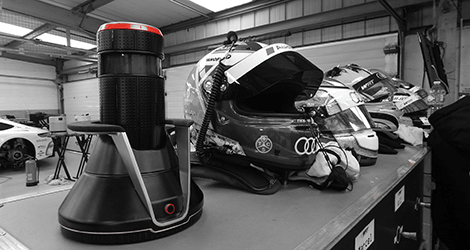
Lewis Williams / Loughborough University
Race Helmet Sanitiser
Torren is a helmet stand that safely removes moisture and odours quickly from full-faced crash helmet comfort linings while sanitising the expensive, often custom, safety kit without damaging the interior.
The process prolongs the life of the helmet lining whilst maintaining comfort and optimising performance, while the design of Torren includes aftermarket income from its fragrant sanitisation pods, and is in the progress of iterations to reduce build costs, making it attainable for everyday motorcyclists, weekend racers, and race tracks that loan equipment.
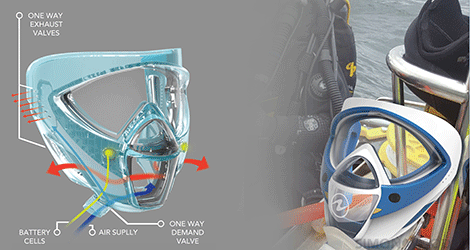
Simon Wood / Staffordshire University
Diving Mask
A redesigned full-face scuba mask that aims to reduce panic in a wearer, but is equally suited for those ‘one-off’ participants of underwater exploration while on holiday.
Wood is a keen diver, and as a result the product is well thought through for simplifying the diving experience, the mask’s function under water and safety, as well as its production methods.






